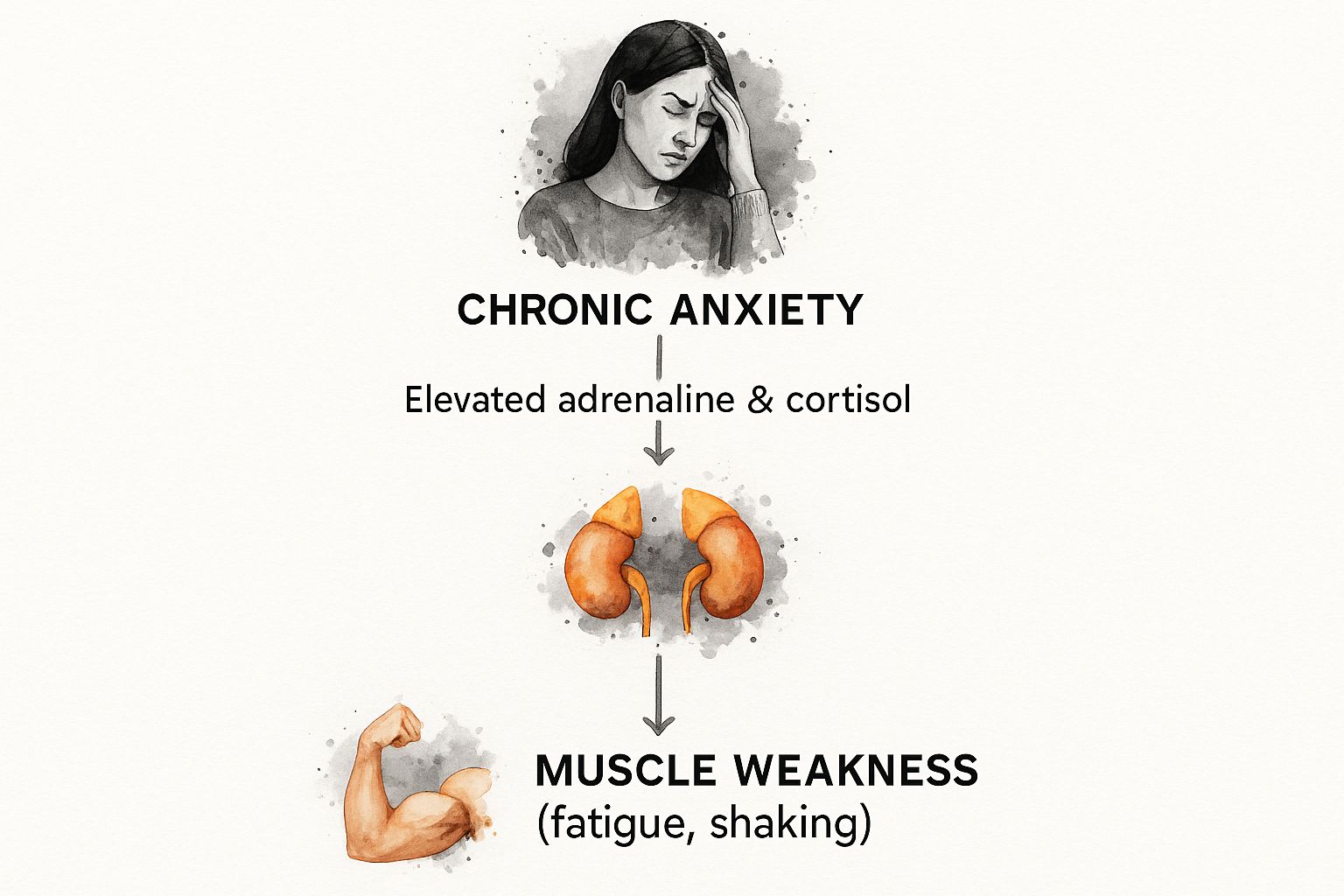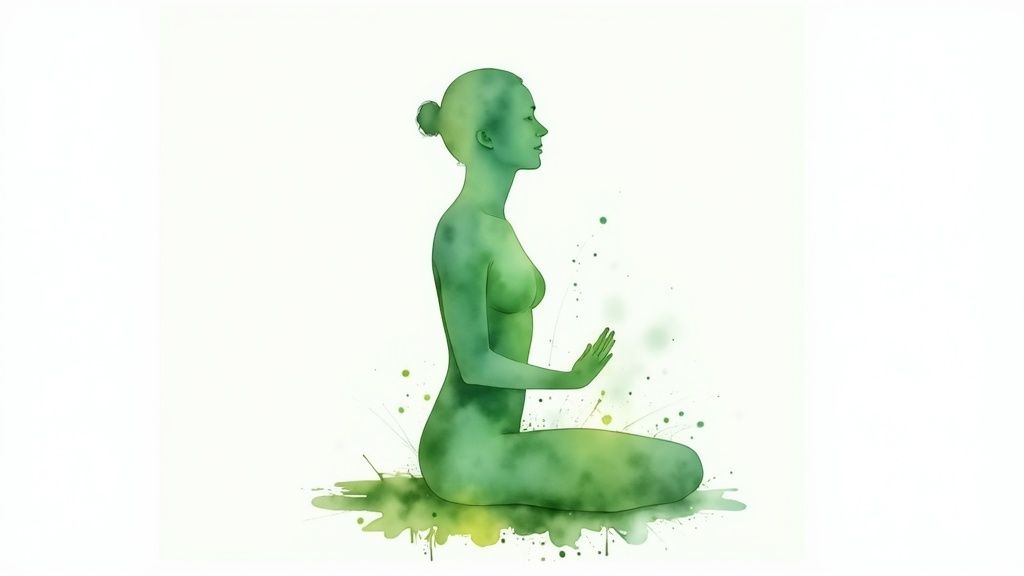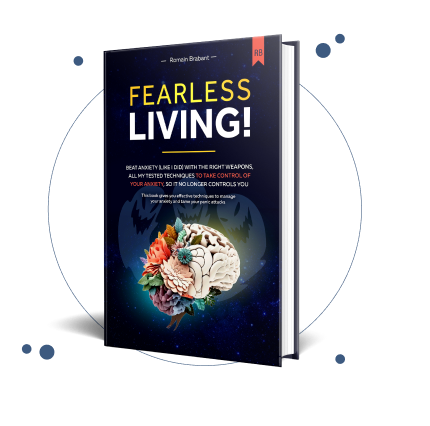
Yes, anxiety can absolutely cause muscle weakness. And no, it's not "all in your head." This is a very real, very physical response to chronic stress, and it's something millions of people experience. The good news? It's a common, understandable, and most importantly, treatable symptom. Understanding where it comes from is the first real step toward reclaiming your strength and living a life free from panic.
The Surprising Link Between Your Mind and Muscles
If you've ever felt your legs turn to jelly during a high-stakes moment, you've felt the mind-muscle connection firsthand. Maybe you've noticed a strange, heavy fatigue in your arms after a long day of worrying. It’s confusing and, frankly, a little frightening. But there’s a logical explanation for it. More importantly, there's a clear path back to feeling strong and in control.
Think of your body's stress response like a car engine. It’s built for short, powerful bursts—like flooring it to merge onto a busy highway. When you face a genuine threat, your body dumps hormones like adrenaline and cortisol into your system. Your muscles tense up, ready for action. This is the classic "fight-or-flight" response, and it’s a brilliant survival tool.
When the Engine Runs Hot for Too Long
But what happens with chronic anxiety? That engine never gets a chance to cool down. It’s stuck revving in the red, even when there's no actual danger on the road.
This constant state of high alert keeps your muscles in a state of low-grade, simmering tension. Over time, this relentless demand simply wears them out. They become exhausted, leading to that profound feeling of weakness, shakiness, or fatigue. Your energy reserves are just… gone.
This infographic breaks down that simple but powerful chain reaction, from an anxious thought to a tired muscle.

As you can see, prolonged anxiety kicks off a hormonal cascade that lands squarely in your muscles, creating the very physical symptoms you feel.
Let's quickly recap how this process unfolds. The table below breaks down the physiological steps that connect an anxious trigger to that feeling of weakness.
How Anxiety Triggers Muscle Weakness
| Anxiety Trigger | Immediate Bodily Response | Long-Term Muscular Effect |
|---|---|---|
| A perceived threat or worry activates the amygdala (the brain's alarm center). | The "fight-or-flight" system kicks in, releasing adrenaline and cortisol. | Muscles are in a constant state of low-grade tension, never fully relaxing. |
| The brain signals the body to prepare for immediate physical action. | Heart rate increases, and blood is redirected to major muscle groups. | Chronic tension leads to muscle fatigue, soreness, and a feeling of heaviness. |
| The mind remains in a state of hypervigilance, scanning for danger. | The body burns through energy and nutrients at an accelerated rate. | Energy reserves are depleted, resulting in profound weakness and exhaustion. |
This cascade is a survival mechanism that's been pushed into overdrive, leaving you feeling drained instead of powerful.
And if this sounds familiar, you're far from alone. Anxiety disorders are incredibly common, affecting an estimated 284 million people around the world. A huge portion of them report physical symptoms just like this, but muscle weakness often gets overlooked or dismissed. Your experience is valid, it's shared by millions, and understanding it is the beginning of your journey back to strength. You can learn more about the global impact of these conditions from the World Health Organization.
The feeling of muscle weakness from anxiety isn't a sign of physical failure. It's a sign that your body's protection system has been working overtime. By learning to calm the alarm, you can absolutely restore your strength and heal.
How Your Body's Alarm System Creates Weakness

To really get why anxiety can make your muscles feel so weak, think of your body as having a high-tech smoke alarm—this is your fight-or-flight response. Its whole job is to spot danger and get you ready for intense, immediate action.
When it senses a real threat, it yanks the alarm cord, flooding your system with powerful stress hormones like adrenaline and cortisol. This is a brilliant system for short, sharp emergencies. It’s the reason you can leap out of the way of a speeding car without even thinking.
But with chronic anxiety, that smoke alarm gets way too sensitive. It starts blaring for burnt toast, a car backfiring, or even just the thought of a fire. Your body is constantly being told it's in grave danger, even when you're perfectly safe.
The Cost of a Constant Alarm
When this alarm is always ringing, your body is perpetually geared up for a fight that never comes. This state of constant high alert is called hyperstimulation, and it puts a massive strain on your muscles.
- Adrenaline Overload: Adrenaline is meant to be a quick, powerful burst of energy, like a shot of espresso for your nervous system. But when it's constantly being pumped out, it burns through your energy reserves fast, leaving you feeling drained and exhausted.
- Chronic Muscle Tension: To get you ready to either fight or run, cortisol and adrenaline keep your muscles tensed and primed. When this tension never gets a chance to release, your muscles become overworked, leading to fatigue, soreness, and that heavy, jelly-like feeling of weakness.
This isn't a sign your muscles are failing you. It’s actually proof that your body's protection system is working overtime. Your muscles are simply exhausted from being on standby 24/7. You can dive deeper into the mechanics of this in our complete fight-or-flight response guide.
Think of your muscles like a clenched fist. Holding that position for a few seconds is no big deal. But try holding it for hours or even days on end. Eventually, your hand would feel incredibly weak, shaky, and sore. That’s exactly what anxiety is doing to your entire body. The hopeful part is, just like you can choose to unclench your fist, you can learn to release this tension.
How Breathing Adds to the Weakness
Anxiety often triggers a subtle but powerful change in your breathing pattern known as hyperventilation, or over-breathing. You might not even notice it, but you start taking quick, shallow breaths from your chest instead of slow, deep breaths from your belly.
This small shift is enough to disrupt the delicate balance of oxygen and carbon dioxide in your bloodstream. While it might not feel dramatic, this chemical imbalance can set off a chain reaction of physical symptoms that directly feed into that feeling of weakness.
The effects of hyperventilation include:
- Dizziness and Lightheadedness: A change in your blood gases can make you feel off-balance and unsteady, which is easy to mistake for muscle weakness.
- Tingling and Numbness: Lowered carbon dioxide levels can cause those strange pins-and-needles sensations in your hands, feet, and even your face.
- Muscle Cramps and Spasms: The altered blood chemistry can mess with muscle function, leading to cramps, twitching, and an even greater sense of weakness.
Just understanding these connections is the first real step toward getting better. Your weakness isn't some mysterious illness; it's a logical, predictable result of an overactive alarm system. By learning how to gently turn down that alarm, you give your body the chance it needs to rest, recover, and get its strength back. This knowledge is your power—it turns a scary symptom into a problem you can absolutely solve.
Is It Anxiety or Something Else?

When your legs feel unsteady or your arms feel heavy, it’s only natural to worry. Your mind can jump straight to the worst-case scenarios, kicking off a cycle of fear that only makes the anxiety—and the weakness—even worse.
This is a tough spot to be in, but there is so much hope for navigating it with clarity. The key is understanding the unique patterns of anxiety-related muscle weakness.
Unlike the weakness you might get from a neurological issue, which is often constant and gets progressively worse, the weakness from anxiety tends to be all over the place. It’s a phantom symptom that comes and goes, often with no clear physical reason. One moment you feel fine, and the next, a wave of fatigue just washes over you.
This feeling can also move around. One day, it’s that classic "jelly legs" sensation. The next, your arms might feel like they’re made of lead. This inconsistency is actually one of the biggest clues that anxiety is the culprit.
Identifying Anxiety's Unique Signature
The most telling sign is the timing. Does the weakness flare up during a stressful meeting? After a difficult conversation? Or when you’re dreading a big event?
If the weakness gets worse when your anxiety is high and eases up when you feel calm, that’s a strong sign the two are connected.
During moments of intense stress, like a panic attack, this weakness can feel completely overwhelming. If you want to dive deeper into these intense episodes, you can find helpful information in our article about what happens during a panic attack.
To help you sort things out, the table below breaks down the typical patterns of anxiety-induced weakness compared to symptoms that should send you to a doctor right away.
Anxiety Weakness vs. Other Medical Conditions
This table is designed to help you spot the differences between weakness that's likely tied to anxiety and symptoms that might point to another medical issue.
| Symptom Feature | Typical in Anxiety-Related Weakness | May Indicate Other Medical Issues (Consult a Doctor) |
|---|---|---|
| Onset and Duration | Comes and goes, often fluctuating with stress levels. | Appears suddenly or worsens steadily over time without relief. |
| Consistency | Shifts around the body (legs one day, arms the next). | Stays in one specific area and is consistently present. |
| Associated Symptoms | Accompanied by other anxiety signs like a racing heart, dizziness, or worry. | Accompanied by symptoms like numbness, vision changes, or difficulty speaking. |
| Trigger | Flares up during periods of high anxiety, panic, or emotional distress. | No clear link to your emotional state; happens regardless of how you feel. |
Remember, this is just a guide, not a substitute for professional medical advice. Seeing a doctor is the most important step you can take.
The Power of a Professional Opinion
Seeing a doctor isn't giving up; it’s taking control.
Getting a clean bill of health can be one of the most powerful tools in your anxiety recovery. It shuts down all those terrifying "what if" thoughts and lets you focus your energy where it actually matters: healing your mind to restore strength to your body.
This step turns fear into fact. Once a professional confirms your body is physically healthy, you can confidently tackle the real root of the problem—the anxiety itself. That clarity is the foundation for building a life free from panic, knowing you're finally on the right path to healing.
Practical Steps to Reclaim Your Strength

Realizing that anxiety can cause muscle weakness is a massive step forward. It takes a scary, confusing symptom and turns it into something you can actually work on. Now for the most hopeful part: you have the power to calm your nervous system and bring your strength back online.
This whole process is about sending your body signals of safety that tell it to stand down from high alert.
That feeling of weakness isn't permanent. Think of it as a temporary state from a system that's just been running on overdrive for too long. By using some simple, hands-on techniques, you can start dialing down that internal alarm and guide your body back to a place of balance and strength.
You can start right now, from wherever you are. These aren't complicated medical procedures; they're accessible tools designed to give you immediate influence over your body’s stress response.
Tame Hyperventilation with Diaphragmatic Breathing
We've already touched on how shallow, rapid breathing is a direct line to feeling weak and dizzy. The antidote is diaphragmatic breathing, often called belly breathing. This technique is like hitting the brakes on your fight-or-flight response because it directly activates the vagus nerve.
It sends a powerful, non-negotiable message to your brain: "I am safe." This simple act helps restore the proper balance of oxygen and carbon dioxide in your blood, easing those physical symptoms.
Here’s an easy way to get started:
- Get Comfortable: Lie on your back or sit in a relaxed position. Put one hand on your chest and the other on your stomach, right below your rib cage.
- Breathe In: Inhale slowly through your nose for a count of four. As you breathe in, focus on letting your stomach rise and push your hand up. Your other hand, on your chest, should stay relatively still.
- Breathe Out: Exhale slowly through your mouth for a count of six. Feel your stomach gently lower as you release the air.
Doing this for just a few minutes each day can make a huge difference in your journey toward healing. For a deeper dive, check out our guide on breathing exercises for anxiety.
Release Stored Tension with Progressive Muscle Relaxation
Progressive Muscle Relaxation (PMR) is a fantastic technique for letting go of the chronic muscle tension that leads to that bone-deep fatigue and weakness. The method is simple: you systematically tense, then relax, different muscle groups all over your body. This process does more than just relax you; it teaches you to feel the difference between tension and relaxation, giving you more conscious control over your physical state.
By intentionally tensing a muscle for a moment, you give it the "green light" it needs to fully let go afterward. This conscious release can undo deep-seated tension you didn't even realize you were carrying, paving the way for recovery.
To really manage the physical side of stress, rest is non-negotiable. Understanding the value of taking time off from work for well-being can be a game-changer.
Reconnect Your Mind and Body with Mindful Movement
When anxiety makes you feel weak, it's easy to start distrusting your own body. Mindful movement is all about rebuilding that vital connection with hope and trust. This isn't about hitting the gym hard; it's about gentle, deliberate motion that brings you back into your body.
- Gentle Stretching: Slowly move through stretches for your major muscle groups. Pay close attention to the physical sensations without judging them. Just notice.
- Slow Yoga: Poses designed for relaxation are perfect for releasing stored tension and improving your overall body awareness.
- Walking Meditation: Take a slow walk outside or even in your house. Focus entirely on the feeling of your feet touching the ground and the simple rhythm of your limbs moving.
Each of these practices sends the same powerful message back to your brain: You are in control. You are not fragile. These steps are your way in—your path to a calmer nervous system and a stronger, more resilient body. The journey to a panic-free life starts with these small, consistent acts of self-care and empowerment.
A Holistic Path to a Panic-Free Life
True, lasting recovery isn't just about managing physical symptoms like muscle weakness. It’s about gently getting to the root of the anxiety itself.
This journey isn't a battle. It's about building a solid foundation of resilience and well-being, one hopeful step at a time.
Think of your anxious thoughts as faulty instructions being sent to your body, triggering alarms that lead to muscle tension and fatigue. The goal isn't to aggressively silence the alarms, but to correct the instructions at the source. This is where powerful, evidence-based approaches can create real, sustainable change and healing.
Rewiring Your Thought Patterns
Cognitive Behavioral Therapy (CBT) is a cornerstone of anxiety recovery for good reason. It gives you a practical framework for identifying the anxious thought patterns that directly trigger your body’s physical stress response.
By learning to recognize and gently reframe these thoughts, you cut off the fuel supply to your anxiety. A worry becomes just a thought—not an immediate threat—and one that you have the power to challenge and change.
This process gradually retrains your brain, which leads to a calmer nervous system and, in turn, stronger, more reliable muscles.
Healing from anxiety isn’t about becoming fearless; it’s about becoming so skilled at managing your thoughts and physical state that fear no longer controls you. It’s about building a life where you are in the driver’s seat. This is completely achievable.
Fortifying Your Mind and Body
Creating a supportive lifestyle is crucial for building long-term resilience against anxiety and its physical toll. Consistency is your greatest ally here.
- Moderate Exercise: Simple activities like brisk walking, swimming, or cycling help burn off excess cortisol and adrenaline. Regular movement also reinforces the mind-body connection, proving to yourself that your body is capable and strong.
- Quality Sleep: Prioritizing 7-9 hours of sleep per night is non-negotiable. Sleep is when your nervous system repairs itself, helping to lower baseline anxiety levels and restore muscular energy.
- Mindful Nutrition: What you eat directly impacts your mood and energy. You can learn more about how to make impactful lifestyle and diet changes for anxiety management to support your recovery.
The Power of Self-Compassion
Perhaps the most profound shift comes from changing your relationship with anxiety itself. Instead of treating it like an enemy to be defeated, try viewing it with a bit of self-compassion.
Accepting that anxiety is present—without judgment—can paradoxically reduce its power over you. This approach lessens the internal struggle, which is a huge source of mental and physical exhaustion on its own.
A holistic approach also means understanding how to support those around you. For instance, learning about practical strategies for managing anxiety in children can offer valuable insights into early intervention and compassionate care.
By building these small, consistent habits, you create a sustainable path not just away from symptoms, but toward a truly panic-free life.
Your Journey to Strength Starts Now
Feeling your own muscles betray you is a deeply unsettling experience. But if there’s one thing to take away from all this, it’s that anxiety-related muscle weakness is a common, understandable, and completely treatable symptom.
It’s not a sign that you’re broken or permanently damaged. It’s simply a signal from a body that’s been working overtime to protect you. The mind-body connection is powerful, but remember, it’s a two-way street.
Just as your mind can trigger physical weakness, it can also guide your body back to strength. The practical strategies we’ve covered—from mindful breathing to gentle movement—are your tools for calming that internal alarm system and restoring balance. You have more power to influence your physiology than you realize.
A life free from the physical grip of anxiety isn’t just a hopeful idea; it’s an achievable reality. Your body has an incredible capacity to heal once it receives consistent signals of safety and care.
This is your path forward. Every small, consistent step you take builds resilience and reinforces your strength. If you're ready to take that next step, our guide on anxiety recovery steps can provide a clear roadmap for your journey.
Reclaiming your peace of mind and physical strength can begin today. You can and will heal.
Got Questions? We Have Answers
When you're dealing with something as strange as anxiety-related muscle weakness, questions are going to come up. It's natural to want to make sense of what you're feeling. Let's tackle some of the most common ones to bring you clarity and hope on your path to feeling stronger.
Can Just One Panic Attack Make My Muscles Feel Weak?
Yes, it absolutely can. During a panic attack, your body gets hit with a massive surge of adrenaline. Think of it like sprinting a marathon you didn't know you were running—that intense 'fight or flight' response burns through a ton of energy.
Once the panic subsides, it's incredibly common for your muscles to feel shaky, exhausted, or weak. Many people describe their legs feeling like 'jelly' right after. This is a completely normal physical reaction, and the feeling will pass as your nervous system calms down. There is hope after a panic attack; your body knows how to recover.
How Long Does This Muscle Weakness from Anxiety Last?
This really varies from person to person. For some, it might just be a temporary feeling that hangs around for a few hours after a particularly stressful event. For those of us dealing with chronic, ongoing anxiety, it can feel like a more persistent symptom that comes and goes over days or even weeks.
The good news? As you get better at managing the root anxiety, you'll notice the muscle weakness shows up less often and doesn't stick around as long. It directly tracks with your progress toward healing.
The real goal isn't to never feel weak. It's to get so good at calming your nervous system that these episodes become short and rare. True strength and healing are found in that resilience.
Will Exercise Make the Weakness Worse?
It sounds backward, I know, but gentle, consistent exercise is one of the best things you can do for this long-term. Pushing yourself through an intense workout when you're already feeling extremely weak probably won't feel great.
But things like a calm walk or some gentle yoga do more than just build physical strength. They help regulate your nervous system and, crucially, they send a powerful message back to your brain: "See? My muscles work just fine." This helps break that vicious cycle of fear and perceived weakness, building a foundation of trust in your body again.
Your path to a calmer, stronger, and panic-free life is right here. At The Anxiety Checklist, we've built a system of practical, step-by-step tools to help you finally understand and move past the physical symptoms of anxiety. Take a look at our system and start your journey to fearless living today at https://anxietychecklist.com.

